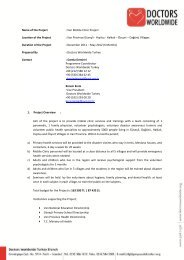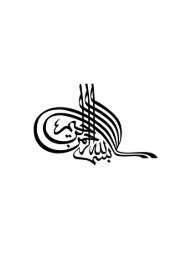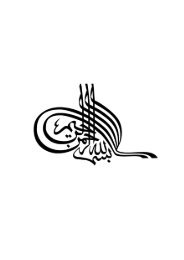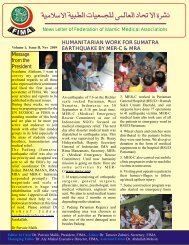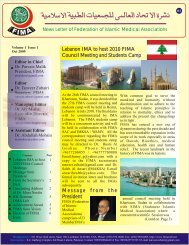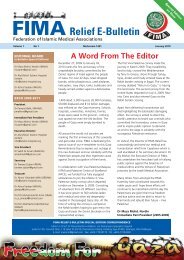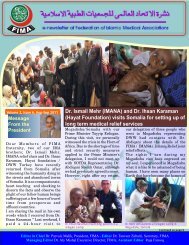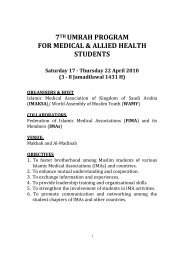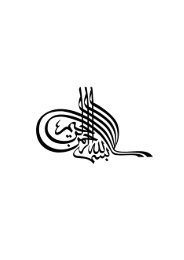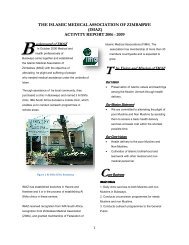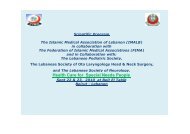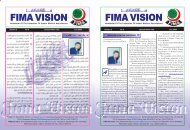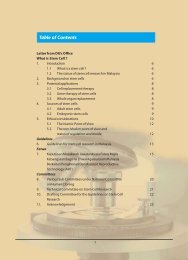FIMA Year Book 2009 - Federation of Islamic Medical Associations
FIMA Year Book 2009 - Federation of Islamic Medical Associations
FIMA Year Book 2009 - Federation of Islamic Medical Associations
Create successful ePaper yourself
Turn your PDF publications into a flip-book with our unique Google optimized e-Paper software.
The ConceptIntroduction:<strong>Medical</strong> curricula, in almost all medicalschools in Muslim countries, have beenfollowing the Western-European stylesover the past century. (1)During the period <strong>of</strong> Westerncolonization and subsequently postindependence,educational institutionsin Muslim countries have copied andapplied Western curricula until thepresent time.In some countries, attempts wereexercised to add some courses in <strong>Islamic</strong>medical ethics and the history <strong>of</strong> past<strong>Islamic</strong> civilization.As a consequence there existed thisdichotomoy between the teaching<strong>of</strong> medical sciences and the properpersonality building along <strong>Islamic</strong> beliefsand guidance (Tarbiyah). This separationfeature <strong>of</strong> the curriculum has always beena cornerstone <strong>of</strong> the Western medicaleducation system . (1)This educational style has achievedsignificant innovations and progressin the prevention and therapy <strong>of</strong> manyillnesses, but failed in dealing withlifestyle-related dilemmas. The majorchallenge, however, being in the area <strong>of</strong>bioethics.Over the past decades, the world enteredinto an era <strong>of</strong> globalization which carriedwith it a dominant monoculture. Inthe medical field, this Western culturebecame controlled by big business whichthrives on a culture <strong>of</strong> pr<strong>of</strong>iteering,domination and control, which notinfrequently impinges and violates moralnorms.Globalization <strong>of</strong> health governancehas its own philosophical background.Health is considered as a commoditywhich has a fiscal value.. (2) Disease and itstherapy becomes pivotal and the holisticcare <strong>of</strong> the person becomes peripheral.It marginalizes preventive medicine,healthcare promotion and only pays lipservice to the wellness paradigm.. Asa consequence, spiritual and culturalaspects <strong>of</strong> health are not consideredas priorities nor crucial in health caredelivery , instead, they only add to thecost <strong>of</strong> health care. (2)Inevitably, the medical pr<strong>of</strong>ession,practitioners, researchers and healthcareleaders included, became increasinglyoverwhelmed and influenced by thisnew philosophy <strong>of</strong> big business inpharmaceutical companies, equipmentmanufacturers and insurance companies.Worldwide proliferation <strong>of</strong> medicalinventions and breakthroughs thattook place over the past decades, haveraised wide hopes and expectations forremedies to many unresolved humanailments. At the same time, they haveposed major dilemmas to the Westernbiomedical model. The medical andscientific world has witnessed a plethora<strong>of</strong> complicated ethical, religious, socialand legal implications. Although codes<strong>of</strong> medical ethics have been adopted afterWorld War II, yet, unethical practicescontinued to proliferate.Humanity has suffered disastrous<strong>FIMA</strong> <strong>Year</strong><strong>Book</strong> <strong>2009</strong>74




